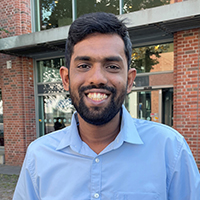Master Programme in Resource Recovery - Polymer Materials for the Circular Economy, spring, 120 hp
Our programme in short
Our programme focuses on polymer materials and their integration into a circular economy. It includes the concepts of polymer recycling, reuse, biodegradation, and their ecological impact. Additionally, it explores the development of renewable biopolymers and polymers that align with circular economy principles.
Within the programme, there is comprehensive coverage of the production, applications, and properties of plastics, textiles, and composite materials. Special attention is given to the potential of utilising biologically derived raw materials for polymer creation and their subsequent biological breakdown. Another focus is on the recycling of polymers as well as on the development of composites from natural fibres. The educational curriculum also incorporates the learning of practical laboratory methods to foster fundamental skills in the processing of plastics, composite manufacturing and structural characterisation, and material property testing.
Research in resource recovery and textile technology
As a student in this Master's programme, you will have the opportunity to engage in the forefront of the university's research activities focussed on resource recovery and textile technology.
Programme structure
In the first term, the programme places a specific emphasis on courses pertaining to polymer materials.
During the subsequent term, you will acquire broad competencies within the present state and future directions within the field of resource recovery on both a global and national scale. This entails an exploration of business insights and methodological knowledge, including life cycle analysis.
Lastly, the programme includes a year-long degree project yielding 60 ECTS credits, wherein you will investigate the area of your particular interest in depth. This degree project can be conducted either within the industry or in collaboration with our esteemed researchers and doctoral candidates at the Swedish Centre for Resource Recovery and the Swedish School of Textiles at the University of Borås. It is also possible to do a degree project yielding 30 ECTS credits by taking additional elective courses.
Career opportunities
This educational programme prepares you for professional roles as an engineer, product developer, researcher or manager, where you need knowledge regarding how polymer based materials act in the circular economy as well as the bioeconomy. The programme will also make you a global community builder with the knowledge necessary to take on challenges, and to set up professional networks in the area of polymers and the society.



